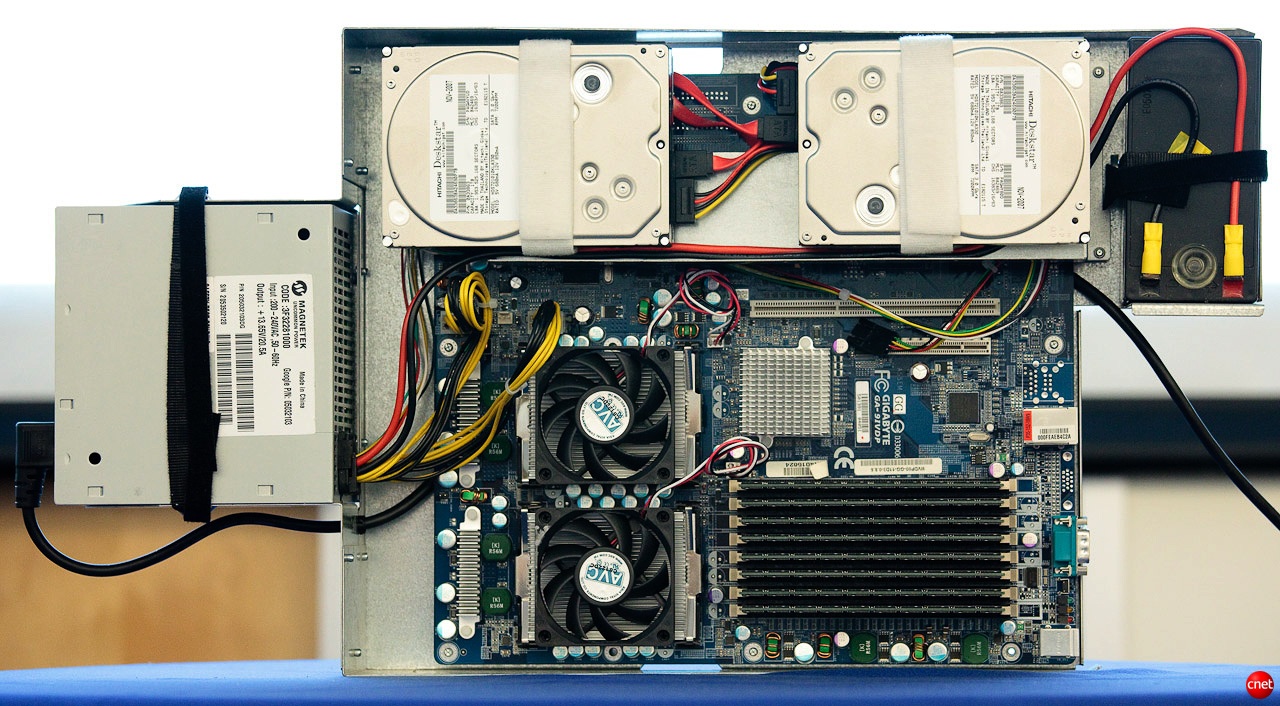Google Picks Gigabyte for Efficiency/Reliability
Google this week released details of how it builds servers at its major data centers. Not surprisingly, Google focused on efficiency and power, two big criteria for running an always online operation.
Google engineer Ben Jai revealed that Google used large shipping containers that can hold up to 1,160 servers at once. Each server is a 2U server chassis and are backed up by battery power in case of outages. The biggest difference however, is that Google builds each server with its own battery backup unit.
Typically, data centers have large uninterruptable power supplies (UPS) that will supply backup power to whole racks of servers. Jai however, said that this only achieves up to 95-percent power efficiency. Google's servers, which are custom designed by Jai and his team in house, use individual batteries for each server. Jai said that Google was able to achieve greater than 99.9-percent efficiency.
Using this method, Google is able to allow backup power to be supplied to servers that require it, not an entire rack. This method also allows Google to fully track power consumption and efficiency on a very granular level.
The individual servers themselves use motherboards by Gigabyte. For the past two years, Gigabyte has been positioning its motherboards as top performers when it comes down to power utilization and heat efficiency. The servers also contain two CPUs and two hard drives each, and a stock load of memory. Jai mentioned that Google uses CPUs from both AMD and Intel.
In this particular server, Google uses a Gigabyte GA-9IVDP, which is not available to the general public.
Image: courtesy of Stephen Shankland/CNET
Get Tom's Hardware's best news and in-depth reviews, straight to your inbox.
-
Shadow703793 Good news for Gigabyte. More specs would have helped, esp. regarding the HDD(10k or 15k?,etc) and the motherboard model(s).Reply -
Flameout i'll be looking for 3 years warranty on parts that i buy for my next compy. i know asus has it, but does gigabyte?Reply -
my_name_is_earl that's a pretty nice open case. Very useful for switching out component. Need one of those for my computer store as we regularly fixes PCs and the likes. Too busy to do one myself :( Anyway, I build all my computer using Gigabyte motherboard so I kind of know what this article is about and too agree with Google's decision.Reply -
ravenware Cool Gigabyte has really stepped up their game as of late.Reply
I have been eyeballing MSI too. They slipped for a while but now seem to be offering good competitive boards with nice layouts.
-
scimanal 7.2K RPM drives I have some of those same drives sitting on my desk. SATA Hitachi Deskstars - not SAS (no need since these are commonly used in massive parallel database operations. IE no vmware etc ) The massive storage would be in separate SAN units, much like IBMs storage units.Reply
I am curios about mobo model as well, but I assume it varies, just look at Gigabytes most recent server mobos. They are across the board very efficient. I suspect allot of the efficiency lies in -
ilikesoup The GA-9IVDP has been rumored since 2006. I found a thread where a guy said he got a system built around a GA-9IVDP as a signing bonus from google.Reply -
hellwig Shipping containers? Those big solid metal ones? I wonder if google counts the power it takes to circulate air through one of those. They aren't designed to be very open to air flow, not when they travel on an open-deck ship across the ocean.Reply -
perhaps they forgot to mention that separate batteries often have a lower efficiency than a large one?Reply
The 95% VS 99% efficiency quickly gets lost if you know that if 1 battery has an efficiency of 95%. 16 smaller batteries will have a total efficiency of 90,31% (every doubling of battery adds half of the efficiency to the total sum).
In other words, they'd be better off with a large capacity battery and controllers that will redirect power where needed, as opposed to separate cells for each rackserver.
Either way, google must know something Yahoo or others don't, because their search engines are just amazing! -
Milleman A battery on each server...? Maybe they are right regarding efficiency. But they only last around 2 years. Then each battery has to be changed. How's that for cost and efficiency?Reply
